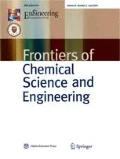References
Peng C, Du Y, Feng X, Hu Y, Fang X. Research and development of hydrocracking catalysts and technologies in China. Frontiers of Chemical Science and Engineering, 2018, 12(4): 867–877
Xu S, Zhang X, Cheng D, Chen F, Ren X. Effect of hierarchical ZSM-5 zeolite crystal size on diffusion and catalytic performance of n-heptane cracking. Frontiers of Chemical Science and Engineering, 2018, 12(4): 780–789
Wang Y, Zhang J. Structural engineering of transition metal-based nanostructured electrocatalysts for efficient water splitting. Frontiers of Chemical Science and Engineering, 2018, 12(4): 838–854
Wang Z, Pu Y, Wang D, Wang J-X, Chen J-F. Recent advances on metal-free graphene-based catalysts for the production of industrial chemicals. Frontiers of Chemical Science and Engineering, 2018, 12 (4): 855–866
Hu S, Gao Q, Wang X, Yang J, Xu N, Chen K, Xu S, Ouyang P. Efficient production of D-1,2,4-butanetriol from D-xylose by engineered Escherichia coli whole-cell biocatalysts. Frontiers of Chemical Science and Engineering, 2018, 12(4): 772–779
Author information
Authors and Affiliations
Corresponding authors
Additional information
Kequan Chen received a Ph.D. degree in Biochemical Engineering from Nanjing Tech University in 2009. He then joined Prof. Jieyu Chen’s group at Akita Prefectural University in Japan as a postdoctoral fellow from 2009 to 2010. He joined the College of Biotechnology and Pharmaceutical Engineering in Nanjing Tech University in 2011 and was promoted to a full Professor in 2017. His current research interests focus on conversion of biomass to chemical with biocatalysts and immobilized enzyme with nanomaterials.
Prof. Dangguo Cheng received his B.S. and Ph.D. degrees in Chemical Engineering from Tianjin University in 2001 and 2006, respectively. Then he joined Department of Chemical and Biological Engineering, Zhejiang University as an assistant professor and was promoted as full professor in 2018. His research interests mainly focus on the design and application of efficient catalyst for fossil fuel conversion. He received several awards including Excellent Young Scientist of NSFC, Zhejiang Provincial Outstanding Young Scientist and Qiushi Distinguished Young Scholar of Zhejiang University.
Chong Peng is an associate research fellow working in Dalian Research Institute of Petroleum and Petrochemicals, SINOPEC. He received a master’s degree in Chemical Engineering from China University of Petroleum (Beijing) in 2009 and a Ph.D. degree in Chemical Engineering from East China University of Science and Technology in 2018. He is a member of Prof. Yong- Kang Hu’s group, and mainly studies the hydroprocessing catalysts and processes. He devoted himself to the development of clean refining technology and got 37 authorized patents as the first inventor.
Dan Wang joined the College of Chemical Engineering at Beijing University of Chemical Technology as an Associate Professor in 2015. He received a B.Eng. degree in Material Science and Engineering and a Ph.D. degree in Optical Engineering from Zhejiang University, in 2008 and 2013, respectively. He then joined Prof. Jian- Feng Chen’s group at Beijing University of Chemical Technology, as a postdoctoral fellow in chemical engineering and technology. Dr. Wang was a visiting scholar in Prof. Kwang-Sup Lee’s group at Hannam Unviersity from 2008 to 2009 and in Prof. Liming Dai’s group at Case Western Reserve University from 2013 to 2015. His current scientific interests focus on green synthesis and applications of nanomaterials.
Jintao Zhang joined Shandong University in fall 2015 as a full professor. He obtained his Ph.D. degree from the Department of Chemical & Biomolecular Engineering at University of Singapore in 2012. Prior to joining Shandong University, he has been a postdoctoral fellow at Nanyang Technological University and Case Western Reserve University. His research interests include the rational design and synthesis of advanced materials for electrocatalysis, electrochemical energy storage and conversion (e.g., metal-air batteries, supercapacitors, and fuel cells). He has published over 40 peer-reviewed journal papers in leading scientific journals, such as Nature Nanotech., Nature Commun., Angew. Chem. Int. Ed., Energy Environ. Sci., and is the author of one RSC book and 3 book chapters. These publications have earned him more than 4500 citations with H-index 26.
Rights and permissions
About this article
Cite this article
Chen, K., Cheng, D., Peng, C. et al. Green catalytic engineering: A powerful tool for sustainable development in chemical industry. Front. Chem. Sci. Eng. 12, 835–837 (2018). https://doi.org/10.1007/s11705-018-1756-1
Received:
Accepted:
Published:
Issue Date:
DOI: https://doi.org/10.1007/s11705-018-1756-1

